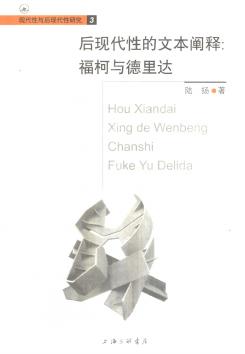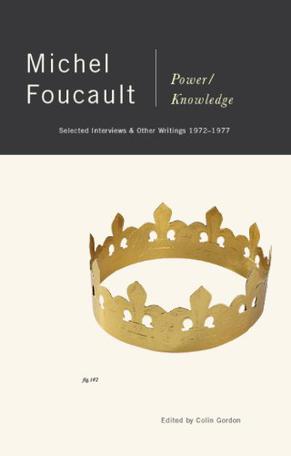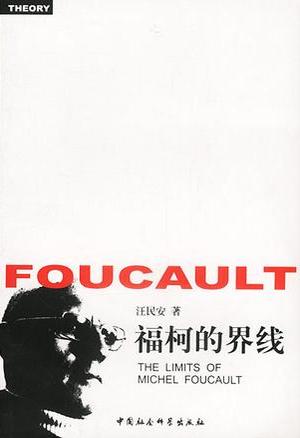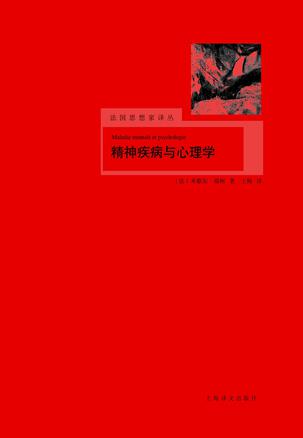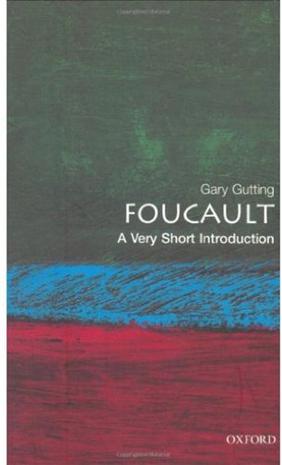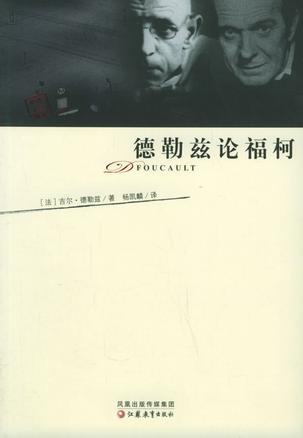欢迎来到相识电子书!
标签:Foucault
-
The Birth of Biopolitics
Picador is proud to publish the sixth volume in Foucault's prestigious, groundbreaking series of lectures at the Collège de France from 1970 to 1984 . The Birth of Biopolitics continues to pursue the themes of Foucault's lectures from Security, Territory, Population. Having shown how eighteenth-century political economy marks the birth of a new governmental rationality--seeking maximum effectiveness by governing less and in accordance with the naturalness of the phenomena to be governed--Michel Foucault undertakes a detailed analysis of the forms of this liberal governmentality. In a direct and conversational tone, this book raises questions of political philosophy and social policy that are at the heart of current debates about the role and status of neo-liberalism in twentieth century politics. -
The Birth of Biopolitics
Picador is proud to publish the sixth volume in Foucault's prestigious, groundbreaking series of lectures at the Collège de France from 1970 to 1984 . The Birth of Biopolitics continues to pursue the themes of Foucault's lectures from Security, Territory, Population. Having shown how eighteenth-century political economy marks the birth of a new governmental rationality--seeking maximum effectiveness by governing less and in accordance with the naturalness of the phenomena to be governed--Michel Foucault undertakes a detailed analysis of the forms of this liberal governmentality. In a direct and conversational tone, this book raises questions of political philosophy and social policy that are at the heart of current debates about the role and status of neo-liberalism in twentieth century politics. -
This Is Not a Pipe
What does it mean to write "This is not a pipe" across a bluntly literal painting of a pipe? René Magritte's famous canvas provides the starting point for a delightful homage by French philosopher and historian Michel Foucault. Much better known for his incisive and mordant explorations of power and social exclusion, Foucault here assumes a more playful stance. By exploring the nuances and ambiguities of Magritte's visual critique of language, he finds the painter less removed than previously thought from the pioneers of modern abstraction. -
The Chomsky-Foucault Debate
Two of the twentieth century's most influential thinkers debate a perennial question. In 1971, at the height of the Vietnam War and at a time of great political and social instability, two of the world's leading intellectuals, Noam Chomsky and Michel Foucault, were invited by Dutch philosopher Fons Edlers to debate an age-old question: is there such a thing as "innate" human nature independent of our experiences and external influences? The resulting dialogue is one of the most original, provocative, and spontaneous exchanges to have occurred between contemporary philosophers, and above all serves as a concise introduction to their basic theories. What begins as a philosophical argument rooted in linguistics (Chomsky) and the theory of knowledge (Foucault), soon evolves into a broader discussion encompassing a wide range of topics, from science, history, and behaviorism to creativity, freedom, and the struggle for justice in the realm of politics. In addition to the debate itself, this volume features a newly written introduction by noted Foucault scholar John Rajchman and includes additional text by Noam Chomsky. -
The Foucault Effect
Based on Michel Foucault's 1978 and 1979 lectures at the Collège de France on governmental rationalities and his 1977 interview regarding his work on imprisonment, this volume is the long-awaited sequel to Power/Knowledge. In these lectures, Foucault examines the art or activity of government both in its present form and within a historical perspective as well as the different ways governmentality has been made thinkable and practicable. Foucault's thoughts on political discourse and governmentality are supplemented by the essays of internationally renowned scholars. United by the common influence of Foucault's approach, they explore the many modern manifestations of government: the reason of state, police, liberalism, security, social economy, insurance, solidarity, welfare, risk management, and more. The central theme is that the object and the activity of government are not instinctive and natural things, but things that have been invented and learned. The Foucault Effect analyzes the thought behind practices of government and argues that criticism represents a true force for change in attitudes and actions, and that extending the limits of some practices allows the invention of others. This unique and extraordinarily useful collection of articles and primary materials will open the way for a whole new set of discussions of the work of Michel Foucault as well as the status of liberalism, social policy, and insurance. -
Michel Foucault
This book, which Foucault himself has judged accurate, is the first to provide a sustained, coherent analysis of Foucault's work as a whole. . To demonstrate the sense in which Foucault's work is beyond structuralism and hermeneutics, the authors unfold a careful, analytical exposition of his oeuvre. They argue that during the of Foucault's work became a sustained and largely successful effort to develop a new method—"interpretative analytics"—capable fo explaining both the logic of structuralism's claim to be an objective science and the apparent validity of the hermeneutical counterclaim that the human sciences can proceed only by understanding the deepest meaning of the subject and his tradition. . "There are many new secondary sources [on Foucault]. None surpass the book by Hubert Dreyfus and Paul Rabinow. . . . The American paperback edition contains Foucault's 'On the Genealogy of Ethics,' a lucid interview that is now our best source for seeing how he construed the whole project of the history of sexuality."—David Hoy, London Review of Books -
The Archaeology of Knowledge
Madness, sexuality, power, knowledge-are these facts of life or simply parts of speech? In a series of works of astonishing brilliance, historian Michel Foucault excavated the hidden assumptions that govern the way we live and the way we think. The Archaeology of Knowledge begins at the level of 'things said' and moves quickly to illuminate the connections between knowledge, language, and action in a style at once profound and personal. [combination of two works: "L'archéologie du savoir" 1969 & "L'ordre du discours" 1971 ("The Discourse on Language" as appendix pp. 215-37)] -
Power/Knowledge
Michel Foucault has become famous for a series of books that have permanently altered our understanding of many institutions of Western society. He analyzed mental institutions in the remarkable Madness and Civilization; hospitals in The Birth of the Clinic; prisons in Discipline and Punish; and schools and families in The History of Sexuality. But the general reader as well as the specialist is apt to miss the consistent purposes that lay behind these difficult individual studies, thus losing sight of the broad social vision and political aims that unified them. . Now, in this superb set of essays and interviews, Foucault has provided a much-needed guide to Foucault. These pieces, ranging over the entire spectrum of his concerns, enabled Foucault, in his most intimate and accessible voice, to interpret the conclusions of his research in each area and to demonstrate the contribution of each to the magnificent -- and terrifying -- portrait of society that he was patiently compiling. . For, as Foucault shows, what he was always describing was the nature of power in society; not the conventional treatment of power that concentrates on powerful individuals and repressive institutions, but the much more pervasive and insidious mechanisms by which power "reaches into the very grain of individuals, touches their bodies and inserts itself into their actions and attitudes, their discourses, learning processes and everyday lives" . Foucault's investigations of prisons, schools, barracks, hospitals, factories, cities, lodgings, families, and other organized forms of social life are each a segment of one of the most astonishing intellectual enterprises of all time -- and, as this book proves, one which possesses profound implications for understanding the social control of our bodies and our minds. . Annotation Focault interprets his writtings about sexuality, politics and punishment. -
傅柯:危險哲學家
做個危險人物,努力存在並化身為某個危險,這將意味著處於某種主體稟性,和一個不穩定的立場中。在這個立場裡,我們有最大的機會進行差異,擺脫束縛;而此地所展現的也並非某種替代方案或某種一概地拒絕,而恰好是能量倒置的可能性、異議與斷裂。――Alain Brossat 朱元鴻?國立交通大學社會與文化研究所教授/專文推薦 苑舉正?國立臺灣大學哲學系教授兼系主任、李尚仁?中研院歷史語言研究所副研究員、林志明?國北教大學藝設系教授、黃冠閔?中研院中國文哲所副研究員、劉紀蕙?國立交通大學社會與文化研究所教授、楊凱麟?國立台北藝術大學美術系教授/推薦 我一直期待臺灣能出現一本有關傅柯的書,它不但能散發來自巴黎左翼知識分子慣有的挑釁意味,也能夠在閱讀後留下深深的哲學反思。來自巴黎的Alain滿足了我的期待。本書中的所有文章環繞在傅柯最著名的三個概念:歷史、權力與政治。我卻在閱讀本書後發現,這三個概念共同呈現了超越社會的理解:對社會的愛與關懷;這也是我對於人倫的理解。――苑舉正?國立臺灣大學哲學系教授兼系主任 Brossat的傅柯再次讓我們見識到對傅柯的真正思考不可能是陳腔濫調。哲學的涉險、問題性的舖陳、差異的能量、布置性的思辯……成為重新構思傅柯的清新啟發。 對於傅柯及其時代,Brossat既曾在場又富含後設,正是這樣非比尋常的位置,傅柯的反抗與革命滿懷感情的復活,成為哲學的活體。――楊凱麟?國立台北藝術大學美術系教授 這並非一本研究傅柯的論文集,而是「跟著傅柯」一起探索的猶如一場持續進行的「對話」。這種「處於進行式中」的對話關係,可比擬傅柯所謂的「診斷」,更可說是Alain Brossat在「現時中」進行哲學研究的實踐。 1968年夏季,傅柯受邀在巴黎附近建立一所新的哲學系,先後數年之間加入諸如德勒茲、李歐塔、巴迪烏,以及本書作者Alain Brossat等多位學者,在二十世紀的人文社會思想界發揮了廣泛且深遠的影響力。 這本論文集之所以難得,不因為是另一部傅柯的研究,而是因為作者明確地用「跟著他」(avec lui)的方式,而得到源源不絕的啟發。 對於當代哲學家,存在著兩種研究方式:「對他」(sur lui),寫下專論;或是「跟著他」,一起探索研究。這本書顯然屬於後者。 所有集結的文章凸顯了一種方法:以某個獨特的時空環境,連結現時中某個問題。雖然問題並沒有獲得解決,卻在這種持續進行的對話中,得以清晰、被探討,進而重新組構。 本書篇篇論文都穿越了傅柯所曾給出的線索,在哲學思想的探究上,注入一股激盪與鼓舞的力量。 -
福柯的最后一课:关于新自由主义,理论和政治
编辑推荐 ·米歇尔·福柯在“生物政治的诞生”一课中对新自由主义所作的分析,在法国左派阵营内造成了不小的震动:是否福柯在生命的最后时期正在变成一个自由主义者?他的这一课不是表明他自1980年代初即开始进入一条危险的道路?这位在1968年5月之后代表激进左派的主要人物,在其生命的最后时刻正在“向右转”? ·本书作者试图为这一系列质疑提供一个全新的且原创性的分析。在作者看来,当福柯决定就新自由主义的传统讲一课时,他其实逾越了知识界中的一条深深的界线;而福柯的巨大勇气就在于把由知识界左派设立的象征性栅栏击得粉碎,尤其是那个反对新自由主义传统而表现为激进的左派。 ·如何去突破左派一系列陈词滥调般的“分析模式”,如何去设想一种新的观察话语并创造一种新的批判理论,如何恢复皮埃尔·布迪厄所谓“左派的极端自由主义传统”计划?作者正是希望通过重读福柯论述新自由主义的文章来回应他所谓“再创左派的任务”。 内容简介 福柯在其晚年关于新自由主义讲课,给左派人士留下了诸多疑问和不解,以至于有人不愿多讲,甚至回避。事情过了几十年,年轻的法国学者拉加斯纳里公开站出来为福柯打抱不平,试图恢复福柯本来的激进左派真面目,这是本书的由来。 但本书不止步于此,其深层的意旨则是要对新自由主义重新进行审视、剖解。通过重读福柯这一课的微言大义,作者指出,福柯的用意在于提供方法,在于将新自由主义作为一种工具,以此来换一种思路,质疑政治哲学和社会理论,质疑权力、法律、国家、解放等传统概念。 如何由此出发去建构一种并非反动的政治,去重新发明一种左派的激进自由主义传统,去重新表述批判理论的话语,去设计一种解放实践?我们需要倾听的正是“福柯的最后一课”。 -
福柯的界线
作 者:汪民安著 页数:339页 出版社:中国社会科学出版社 出版日期:2002 简介:本书分为理性/疯癫、话语/知识、权力/身体、伦理学/美学四章,包括疯癫与空间,医学的语法,人的诞生和死亡,考古学和陈述,权力和理性,生活的艺术等内容。 -
精神疾病与心理学
20世纪50年代初期的米歇尔•福柯对心理学和精神病学进行了系统深入的学习,于1952及1953年分别获得精神病理学和实验心理学相关文凭,并在此期间聆听了法国精神分析学大师雅克•拉康的课程。1954年,福柯发表了他的第一本专著《精神疾病与人格》(Maladie mentale et Personnalité),但后来他对这部著作不甚满意,认为它不成熟,因此在1962年再版时做了大量修订,书名也随之更改为《精神疾病与心理学》。 福柯在此书中强调“心理学只在疯癫被控制之后才成为了可能”,将疯癫的历史放入社会及文化结构中进行探讨。他通过对精神疾病特殊性的分析、对心理学具体形式的研究以及对疯癫状态的定义,呼应了书中的两大方面:精神疾病的心理学范畴以及疯癫与文化的辩证关系。 -
Foucault
Foucault is one of those rare philosophers who has become a cult figure. Born in 1926 in France, over the course of his life he dabbled in drugs, politics, and the Paris SM scene, all whilst striving to understand the deep concepts of identity, knowledge, and power. From aesthetics to the penal system; from madness and civilisation to avant-garde literature, Foucault was happy to reject old models of thinking and replace them with versions that are still widely debated today. A major influence on Queer Theory and gender studies (he was openly gay and died of an AIDS-related illness in 1984), he also wrote on architecture, history, law, medicine, literature, politics and of course philosophy, and even managed a best-seller in France on a book dedicated to the history of systems of thought. Because of the complexity of his arguments, people trying to come to terms with his work have desperately sought introductory material that makes his theories clear and accessible for the beginner. Ideally suited for the Very Short Introductions series, Gary Gutting presents a comprehensive but non-systematic treatment of some highlights of Foucault's life and thought. Beginning with a brief biography to set the social and political stage, he then tackles Foucault's thoughts on literature, in particular the avant-garde scene; his philosophical and historical work; his treatment of knowledge and power in modern society; and his thoughts on sexuality. -
福柯思想辞典
编辑推荐 • 福柯常说,概念的配备,在严格意义上就是提供一个“工具箱”。然而,概念被制造出来、被固定下来,尔后它们还可能被抛弃、被修改,或者其含义被进一步扩大。概念就这样始终处于一种不断修补和移位的运动之中。这给《福柯思想辞典》的撰写计划提出了艰巨的挑战。 • 作者朱迪特•勒薇尔选择接受这一挑战。她用一种独特的编排方式,让这本《福柯思想辞典》清晰地呈现出福柯一生持续“提问”的主要路径。 • 哲学的任务不是解决问题,而在于“提问”。《福柯思想辞典》能够对福柯表示的最大敬意,即是它恢复了其思想中的提问方面。因此,《福柯思想辞典》并不是一本简单地按照字母顺序排列的术语汇编,它的目的在于试图重建其连续的或相互重叠的众多提问,这些提问才是福柯分析中极其宝贵的财富。 内容简介 《福柯思想辞典》由近60个术语组成的“术语篇”和13个人名组成的“人物篇”构成。 在“术语篇”,作者既介绍了福柯从其他思想家那里借来的哲学概念,还介绍了福柯自创的前所未闻的概念。作者试图通过这些概念梳理,系统地勾画福柯的思路,以便使其哲学历程变得容易理解,同时顾及其经历的复杂性,其众多的分支部分和变化。 在“人物篇”,作者介绍了一些在福柯思想的形成过程中起着决定性作用的思想家,包括巴塔耶、布朗肖、德勒兹、德里达、康德、尼采、萨特等。作者指出了他们之间的交汇点、论战的分歧、争论的领域或概念的借用。正是这些因素,在福柯长达三十年的哲学和政治思考中,支配着其思想的既复杂又开放的过程。 最后,作者还加入了“福柯的著作目录”部分,以便读者通过阅读相关书籍,能够深入地追踪福柯思想中的某些线索。 -
德勒兹论福柯
时至今日,德勒兹与福柯已成为20世纪西方思想史上的两则传奇。不读德勒兹的《德勒兹论福柯》,便不能说了解福柯。因为在德勒兹之后,福柯已不是原来的福柯,就如弗洛伊德在拉康之后,不再是原来的弗洛伊德一样。德勒兹与福柯这两颗法国思想界的熠熠红星在本书中一起迸放光芒,使福柯成为理解德勒兹的一扇重要窗口,使德勒兹成为透视福柯的不二法门。由福柯到德勒兹,再由德勒兹到福柯,两股思想之流不断地牵引、碰撞、发光与褶皱,本书所呈现的正是这般奇诡景致。 -
The Order of Things
When one defines order as a sorting of priorities, it becomes beautifully clear as to what Foucault is doing here. With virtuoso showmanship, he weaves an intensely complex history of thought. He dips into literature, art, economics and even biology in The Order of Things, possibly one of the most significant, yet most overlooked, works of the twentieth century. Eclipsed by his later work on power and discourse, nonetheless it was The Order of Things that established Foucault's reputation as an intellectual giant. Pirouetting around the outer edge of language, Foucault unsettles the surface of literary writing. In describing the limitations of our usual taxonomies, he opens the door onto a whole new system of thought, one ripe with what he calls exotic charm. Intellectual pyrotechnics from the master of critical thinking, this book is crucial reading for those who wish to gain insight into that odd beast called Postmodernism, and a must for any fan of Foucault. -
Discipline and Punish
In the middle ages there were gaols and dungeons, but punishment was for the most part a spectacle. The economic changes and growing popular dissent of the eighteenth century made necessary a more systematic control over the individual members of society, and this in effect meant a change from punishment, which chastised the body, to reform, which touched the soul. Foucault shows in fascinating detail the development of the Western system of prisons, police organizations, administrative and legal hierarchies of social control --- and the growth of disciplinary society as a whole. He also reveals that the comparison between a school and a prison is not purely facetious --- prisons, schools, factories, barracks and hospitals all share a common organization, in which it is possible to control the use of an individual's time and space hour by hour.
热门标签
下载排行榜
- 1 梦的解析:最佳译本
- 2 李鸿章全传
- 3 淡定的智慧
- 4 心理操控术
- 5 哈佛口才课
- 6 俗世奇人
- 7 日瓦戈医生
- 8 笑死你的逻辑学
- 9 历史老师没教过的历史
- 10 1分钟和陌生人成为朋友








